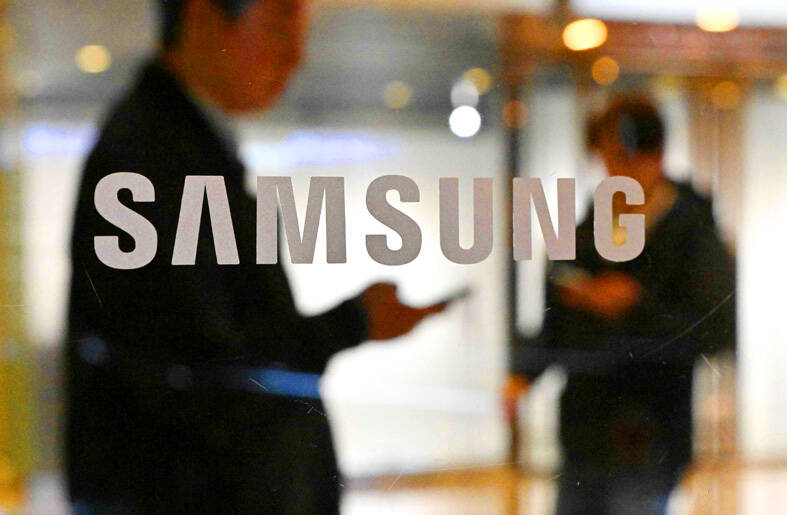US President Joe Biden’s administration has reached an agreement to provide up to US$6.4 billion in direct funding for Samsung Electronics Co to develop a computer chip manufacturing and research cluster in Texas.
The funding announced yesterday by the US Department of Commerce is part of a total investment in the cluster that, with private money, is expected to exceed US$40 billion.
The government support comes from the CHIPS and Science Act, which Biden signed into law in 2022 with the goal of reviving the production of advanced computer chips in the US.

Photo: AFP
“The proposed project will propel Texas into a state-of-the-art semiconductor ecosystem,” US Secretary of Commerce Gina Raimondo said on a call with reporters. “It puts us on track to hit our goal of producing 20 percent of the world’s leading edge chips in the United States by the end of the decade.”
Raimondo said she expects the project to create at least 17,000 construction jobs and more than 4,500 manufacturing jobs.
Samsung’s cluster in Taylor, Texas, would include two factories that would make 4-nanometer and two-nanometer chips. There would also be a factory dedicated to research and development, as well as a facility for the packaging that surrounds chip components.
The first factory would begin production in 2026, with the second starting in 2027, the US government said.
The funding would also expand an existing Samsung facility in Austin, Texas.
As a result, Samsung would be able to manufacture chips in Austin directly for the US Department of Defense, White House National Economic Council Director Lael Brainard said.
Access to advanced technology has become a major national security concern amid competition between the US and China.
In addition to the US$6.4 billion, Samsung has indicated it would also claim an investment tax credit from the US Department of Treasury.
The US government has previously announced terms to support other chipmakers, including Taiwan Semiconductor Manufacturing Co (台積電) and Intel Corp, in projects spread across the country.

Semiconductor business between Taiwan and the US is a “win-win” model for both sides given the high level of complementarity, the government said yesterday responding to tariff threats from US President Donald Trump. Home to the world’s largest contract chipmaker, Taiwan Semiconductor Manufacturing Co (TSMC, 台積電), Taiwan is a key link in the global technology supply chain for companies such as Apple Inc and Nvidia Corp. Trump said on Monday he plans to impose tariffs on imported chips, pharmaceuticals and steel in an effort to get the producers to make them in the US. “Taiwan and the US semiconductor and other technology industries

SMALL AND EFFICIENT: The Chinese AI app’s initial success has spurred worries in the US that its tech giants’ massive AI spending needs re-evaluation, a market strategist said Chinese artificial intelligence (AI) start-up DeepSeek’s (深度求索) eponymous AI assistant rocketed to the top of Apple Inc’s iPhone download charts, stirring doubts in Silicon Valley about the strength of the US’ technological dominance. The app’s underlying AI model is widely seen as competitive with OpenAI and Meta Platforms Inc’s latest. Its claim that it cost much less to train and develop triggered share moves across Asia’s supply chain. Chinese tech firms linked to DeepSeek, such as Iflytek Co (科大訊飛), surged yesterday, while chipmaking tool makers like Advantest Corp slumped on the potential threat to demand for Nvidia Corp’s AI accelerators. US stock

The US Federal Reserve is expected to announce a pause in rate cuts on Wednesday, as policymakers look to continue tackling inflation under close and vocal scrutiny from US President Donald Trump. The Fed cut its key lending rate by a full percentage point in the final four months of last year and indicated it would move more cautiously going forward amid an uptick in inflation away from its long-term target of 2 percent. “I think they will do nothing, and I think they should do nothing,” Federal Reserve Bank of St Louis former president Jim Bullard said. “I think the

SUBSIDIES: The nominee for commerce secretary indicated the Trump administration wants to put its stamp on the plan, but not unravel it entirely US President Donald Trump’s pick to lead the agency in charge of a US$52 billion semiconductor subsidy program declined to give it unqualified support, raising questions about the disbursement of funds to companies like Intel Corp and Taiwan Semiconductor Manufacturing Co (台積電). “I can’t say that I can honor something I haven’t read,” Howard Lutnick, Trump’s nominee for commerce secretary, said of the binding CHIPS and Science Act awards in a confirmation hearing on Wednesday. “To the extent monies have been disbursed, I would commit to rigorously enforcing documents that have been signed by those companies to make sure we get